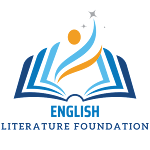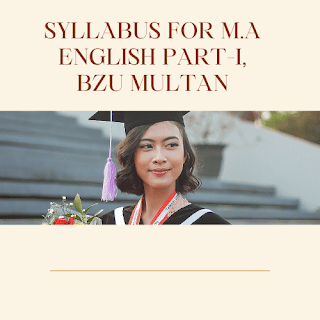SYLLABUS AND STUDY
SCHEME FOR M.A. ENGLISH Part-I
(Session 2009-2011)
Bahauddin Zakariya University, Multan
SYLLABUS FOR M.A ENGLISH Part-I
Paper-I Poetry
Paper-III Novel
Paper-IV Criticism
Paper-V Introduction to Linguistics
M.A. English, Part-I
Note: All the papers are divided into different sections. The students will be required to attempt at least one question from each section in the examination. Besides, the students are expected to have a comprehensive knowledge of the historical development of all the genres, forms and movements including basic concepts and definitions of important terms.
Paper-I, Poetry
This course aims at introducing the students to the development of English poetry in different eras. It starts from Chaucer and ends at Sylvia Plath. The representative poets from each age are taken to highlight various trends in English poetry from 14th to 20th century.
Classical Poetry
Milton Paradise Lost, Book-1
Donne Good Morrow
The Sun Rising
Go and Catch a Falling Star Extasie
Batter My Heart
When Thou Hath Donne
Romantic Poetry
Wordsworth Prelude Book-1
Keats Ode to a Nightingale
Ode on a Grecian Urn Ode to Autumn
Ode on Melancholy
Modern
T.S. Eliot Prufrock
Salvia Plath Daddy
Paper-II, Drama
This paper will introduce students to the origins and development of the classical Greek drama followed by the emergence of Mystery, Miracle and Morality plays during the English Renaissance. Thus an over view of the development of the genre (and sub-genres
i.e. tragedy, comedy) over the centuries will be given followed by an in-depth textual analysis of the plays by the major dramatists.
Classical
Sophocles Oedipus Rex
Renaissance
Marlowe Dr. Faustus
Shakespeare Hamlet
Twelfth Night
Modern
Ibsen A Dollís House
Shaw Major Barbar
Paper-III, Novel
This course is designed to include major novelists of the Classical, Victorian and Modern Age. Tracing the origin and development of the genre in the eighteenth century, the major novelists of English literature are covered under three ages; each with its own distinct style, thus exposing the students to a range of texts and styles beginning with the Picaresque novel of Fielding and moving on to Woolfís technique of the Stream of Consciousness. A compulsory question will be set based on the textual analysis of the prescribed novels.
Classical and Romantic
Fielding Joseph Andrews
Jane Austen Pride and Prejudice
Victorian
George Eliot The Mill on the Floss
Thomas Hardy Return of the Native
Modern
E.M. Forster A Passage to India
Virginia Woolf To the Lighthouse
Paper-IV, Criticism
The purpose of this course is to bring our syllabi on a par with international standards. After familiarizing the students with the tenets of classical literary criticism, it introduces them to the literary approaches of the modern critics i.e. Eliot, Frye followed by the beginnings of postmodern critical theories, rooted in the works of Woolf and introduced later in detail Eagleton. The recent and current trends of post-structuralism will be introduced so as to enable the students to apply these theories to textual analysis. To achieve this objective, a compulsory question of practical criticism will be set on an unseen passage, in the final examination.
Classical
Aristotle Poetics
Longinus On the Sublime
Modern
T.S. Eliot The Tradition and the Individual
Talent
Frye Anatomy of Criticism
Postmodern
V.
Woolf A Room of Oneís Own
Terry Eagleton Modern Literary Theory (Structuralism, Post-Structuralism)
Paper-V, Introduction to Linguistics
This course is designed to introduce the basic notions of linguistics, its various branches and levels of study. It is divided into three sections. The first section provides an introduction to different terms and major sub-divisions of the field of linguistics. The second section provides a brief introduction to the levels of linguistics and the third section focuses on the much-needed area of phonology and phonetics of English. Together they are expected to give a preliminary knowledge of the subject for the study of language in both written and spoken aspects.
Section-I
Historical Perspective
Theoretical and General Linguistics Linguistics VS Traditional Grammar Branches of Linguistics
Sociolinguistics Psycholinguistics Applied Linguistics
Animal Vs. Human Communication
Section-II
Levels of Linguistics Morphology
Syntax Semantics Discourse Pragmatics
Section-III
Phonetics and Phonology of English
Suggested Reading List & Reference Books
Aitcheson, Jean (2004) Teach Yourself Linguistics, Teach Yourself Crystal, D. (1997) Encyclopedia of Language, Cambridge University Press Crystal, D (1997) Linguistics Cambridge University Press
OíConnor JD (1973)
Phonology of English,
Harmondsworth

